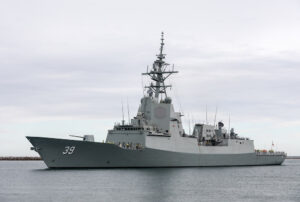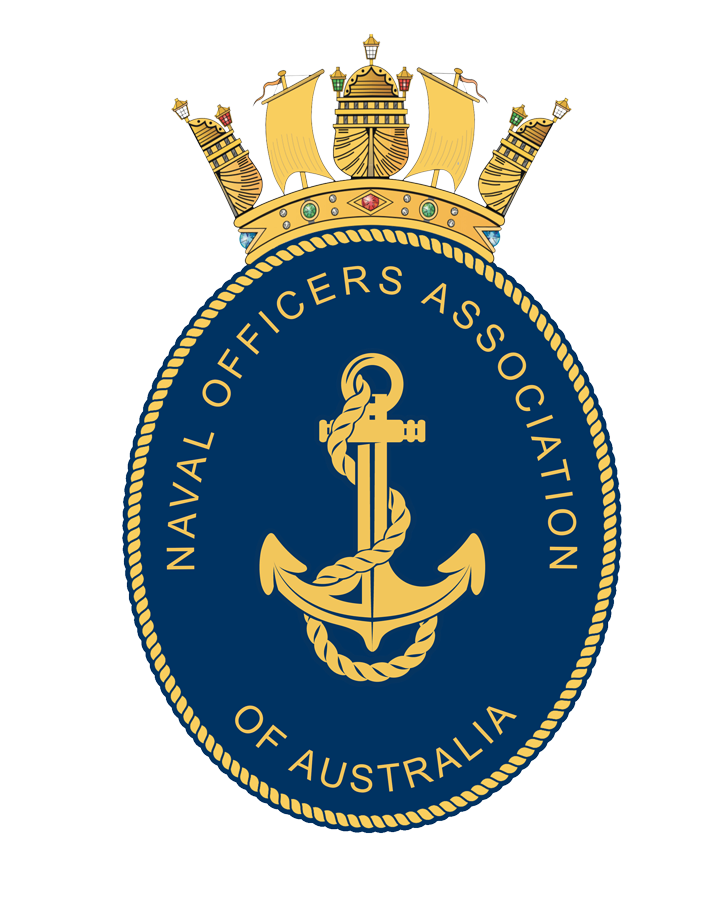Corvettes are not an option for Australia
3 Aug 2023|Rowan Moffitt
Several recent articles, including one last week by the US Studies Centre’s Peter Dean, have promoted the need for corvettes for the Royal Australian Navy. They merit a response.
Dean writes that the defence strategic review calls for an enhanced lethality surface fleet and a greater number of Tier 2 surface combatants. What is a Tier 2 surface combatant? It’s not a naval term. It defines nothing and means nothing, except relatively. Paul Dibb’s defence capability review almost 40 years ago used the concept of tiered naval capability for the first time. Eight Anzac-class frigates were the result.
The Anzac frigates are second-tier ships relative to the destroyers in service back then. They were deliberately underarmed compared with their design capacity to save money in those benign times. The focus then was defending the ‘sea–air gap’ to Australia’s north, when we believed we had 10 years’ warning time of any need to fight. Now we have no warning time and great-power rivalry in our neighbourhood. The Anzacs have since been rearmed.
Apart from the Anzac frigates, now in their third decade of harder service than we expected, we have built three Hobart-class Aegis-equipped frigates, which only Australia calls destroyers. They are derived from the Spanish F100 class—‘F’ as in ‘frigate’. Being equipped with the US Aegis combat system doesn’t make them destroyers, as much as we might wish that to be so. Blue-water navies in our region (China, India, Japan, Korea, the US) all field destroyers that are half as big again as the Hobarts, with twice the firepower. That seems like a sensible benchmark for what a Tier 1 ship really is. We have none and have no plans to get any.

HMAS Hobart – Destroyer or Frigate?
Dean says the surface fleet must be aligned with the 2023 review’s strategy of deterrence by denial and be able to carry out operations in the littorals and archipelagos in Australia’s approaches.
Those littorals and archipelagos cover more of the globe than the entire mainland of Australia and its exclusive economic zone. The area is vast and a very long way away from our naval bases. Even the sea–air gap is small by comparison.
Those distances and the waters they encompass really matter. They are the main factors that define the type of ship that will have any hope of achieving deterrence by denial, because no navy can deny anything where it has no presence. Without presence, persistent presence and lethality, there can be neither denial nor deterrence.
Dean identifies the definition of ‘Tier 2 combatant’ as a key question. He says the public debate over the requirement for a larger number of smaller vessels has largely settled on corvette/light frigate options and that ‘corvette’ has by and large become the de rigueur term in the debate for the Tier 2 surface combatant option.
What public debate? I’ve seen no comment from anyone with lived experience of naval operations in Australia’s context. Much of this coverage is influenced by overseas corvette builders.
Corvettes do not suit Australia’s needs, especially when we’re short of money.
Corvettes are a sensible answer for countries whose geostrategic circumstances make them suitable. Corvettes make sense for nations like India (for its coastal operations and close neighbours hostile towards them) and Indonesia, Malaysia and Singapore, which all exist in archipelagic geography. Australia has no use for small submarines for the same reasons.

Luerssen C90 Corvette
Dean says an option to meet the review’s strategic requirements and its emphasis on speed to capability now, along with the navy’s needs and the ability to maintain continuous shipbuilding, could be Luerssen’s C90 corvette. He says its design would need to be modified to accommodate the RAN’s next-generation MH-60R Seahawk helicopter.
Modifying the C90 to embark the Seahawk and all its associated support systems and crew would require a major and invasive redesign of the ship, not a mere modification. The C90 is intended to carry two uncrewed aerial vehicles of around 300 kilograms each, or a small, crewed helicopter. A Seahawk weighs around 10,000 kilograms. Then there are its handling and traverse system (RAST), weapon magazines, maintenance facilities, crew space requirements and so on.
Buying ships needing major redesigns is expensive folly as the Hunter frigate mess shows. We should build ships that meet our needs as closely as possible and that already incorporate the combat-related systems we operate now. Long experience tells us that this approach will give us suitable capability on time, on budget and most quickly. Such solutions probably won’t come from Europe because mostly those designs have European systems that are not in service here.
Changing after a poor initial choice wastes time and is expensive. The Attack-class submarine is an example, and the sensible but premature replacement of the Taipan and Tiger helicopters will cost billions.
Dean says that the C90 is already in production for the Bulgarian navy and that Luerssen believes its base design provides robust, production-ready vessels that can be easily modified for Australia’s needs. He says this option would provide the RAN with a vessel as capable as, if not more so, the current Anzac-class frigate, but with a massively reduced crewing requirement.
The C90 being in production is irrelevant. It is not production-ready for Australia because it would have to be redesigned. But, more importantly, corvettes are not suitable for Australia. Unless, of course, we are on a wartime budget in a mobilised nation, as we were in World War II. We are neither today.
We need some clear, informed and experienced thinking about the naval force we require. Hopefully the independent analysis of the navy’s force structure will give us that, but I have my doubts.
Corvettes cannot satisfy any of the review’s requirements in Australia’s area of military interest. They cannot contribute anything worthwhile towards the objective of increased lethality or the strategy of deterrence by denial, nor will they add anything towards impactful projection.
The key matter for our combat ships is endurance in the operating environment they face. The main factor determining endurance is crew size and how the ships are supported on operations. Fifty years of driving down crew numbers to save costs has been one of the most debilitating false economies the RAN has suffered. Fewer crew means less endurance. That’s simple, unchanging and inescapable, but it’s been ignored with our modern naval acquisitions.
Examining Bulgaria’s purchase of two C90 corvettes is worthwhile. Bulgaria is smaller than Tasmania. It has one coastal frontier, on the Black Sea, about as long as the distance from Newcastle to Wollongong. Its maritime security interests extend about the same distance to seaward, an expanse of water smaller than the Gulf of Carpentaria. Anyone attacking it from the sea can come only from a single, narrow eastern approach. Corvettes make sense for Bulgaria.
Australia is surrounded on three sides by open ocean (the so-called blue water) and must operate there, as well as in the archipelago to the north (the so-called brown water). Blue-water navies can comfortably and effectively operate in brown-water areas as the RAN has always done, but brown-water ships—including corvettes—will fail quickly in blue-water operations.
If Australia is willing only to fund a brown-water naval combat force, let’s be honest about that. Buying brown-water ships and telling our people we have a lethal blue-water capability that can deliver impactful projection and deterrence by denial would be a very expensive delusion.
AUTHOR
Rowan Moffitt is a retired rear admiral and a qualified surface warfare officer with 40 years’ service in the Royal Australian Navy. He has commanded frigates, destroyers and task groups and his appointments included deputy chief of navy and fleet commander. The views expressed here are his own. Cropped image: Department of Defence.
